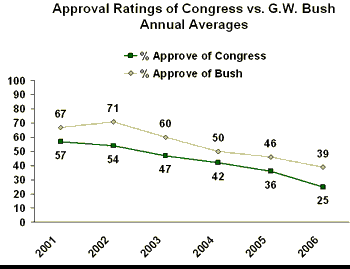Voter Dissatisfaction
A couple of stories out there this morning give hope for a major swing toward the Democrats in this year's midterm election (hope, yes, but there's still lots of work to do). First, this overview article from the WaPo:
Intense and widespread opposition to President Bush is likely to be a sharp spur driving voters to the polls in this fall's midterm elections, according to strategists in both parties, a phenomenon that could give Democrats a turnout advantage over Republicans for the first time in recent years.
Polls have reflected voter discontent with Bush for many months, but as the election nears, operatives are paying special attention to one subset of the numbers. It is the wide disparity between the number of people who are passionate in their dislike of Bush vs. those who support him with equal fervor.
[...]
The premise behind the Democrats' hopes this year is simple, though not easy to quantify: People impassioned by anger or other sentiments are more likely to vote -- even in bad weather and in relatively low-profile races -- than are those who are demoralized or less emotional.
[...]
The Post-ABC News poll found that 59 percent of registered voters approve of their own representative, a lower number than in past months. But only 35 percent approve of the way Congress is doing its job. Forty percent said they plan to vote for a Republican in this year's House elections, and 55 percent said they will vote for a Democrat.
Speaking of job approval for Congress, Daily Kos diarist georgia10 points us to this new Gallup poll on just that subject:
Public approval of the job Congress is doing has dipped to its lowest level of 2006, and is now the worst Gallup has recorded since the closing days of the Democratic majority in the U.S. House of Representatives in 1994.
According to an April 10-13, 2006, Gallup Poll, 23% of Americans approve of the job Congress is doing, while 70% disapprove. The current approval score is slightly below the 25%-27% range seen since January.
[...]
This downward trend in Congress approval is parallel to the decline in public approval of President George W. Bush over the same period. Although ratings of Bush are consistently higher than those for Congress, the similar changes in approval suggest that Americans closely associate the performance of the Republican-led Congress with Bush's performance.
Georgia10 comments:
Simply put, Americans crave a functioning government, and this Republican Congress is not functioning. The GOP has had failure after legislative failure, from the embarrassing budget collapse to the fleeting immigration compromise in the Senate.
We've seen how Republicans try to blame this do-nothing Congress on Democrats. It's a preposterous assertion, of course, given that Republicans control the House, the Senate, and the White House. They are the majority, but they act like they're in the minority to deflect attention away from their in-fighting and their inability to govern. But when the Senate GOP blocks 89% of Democratic proposals on a party-line vote, it's clear that Republicans in Congress care more about partisan politics than, you know, actually passing bills.



0 Comments:
Post a Comment
<< Home